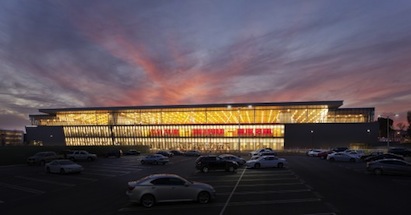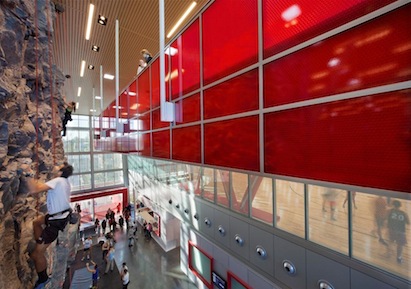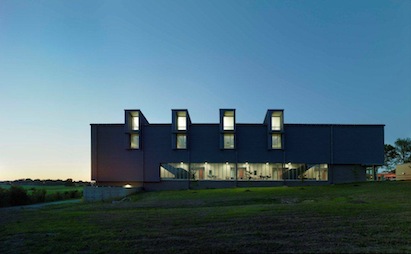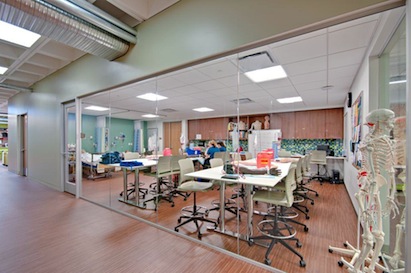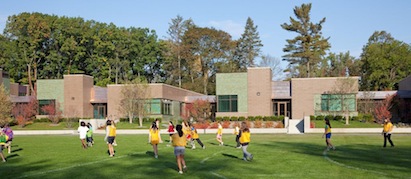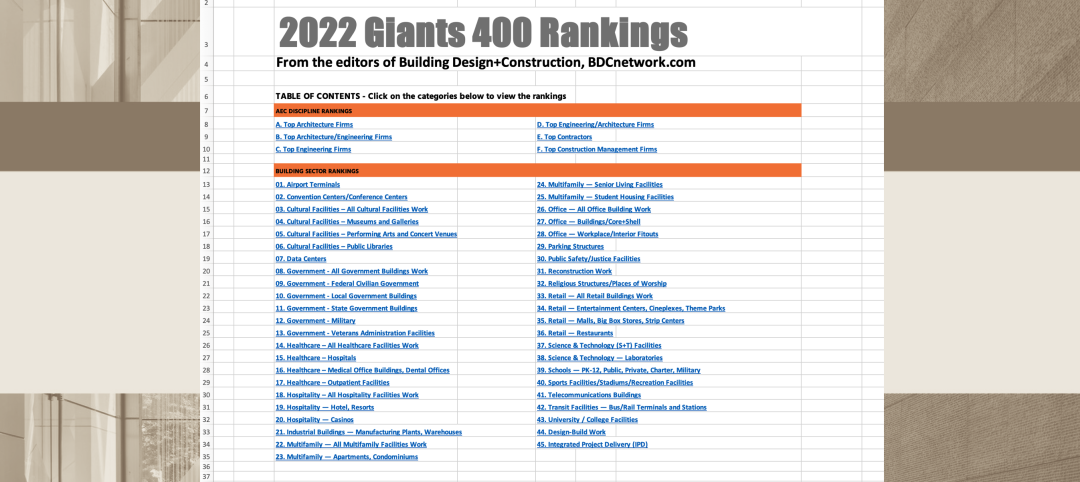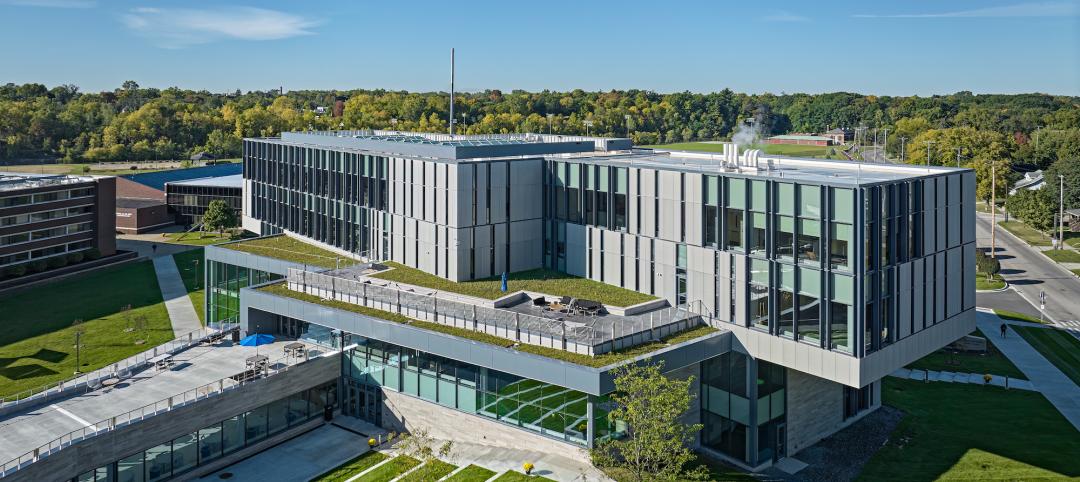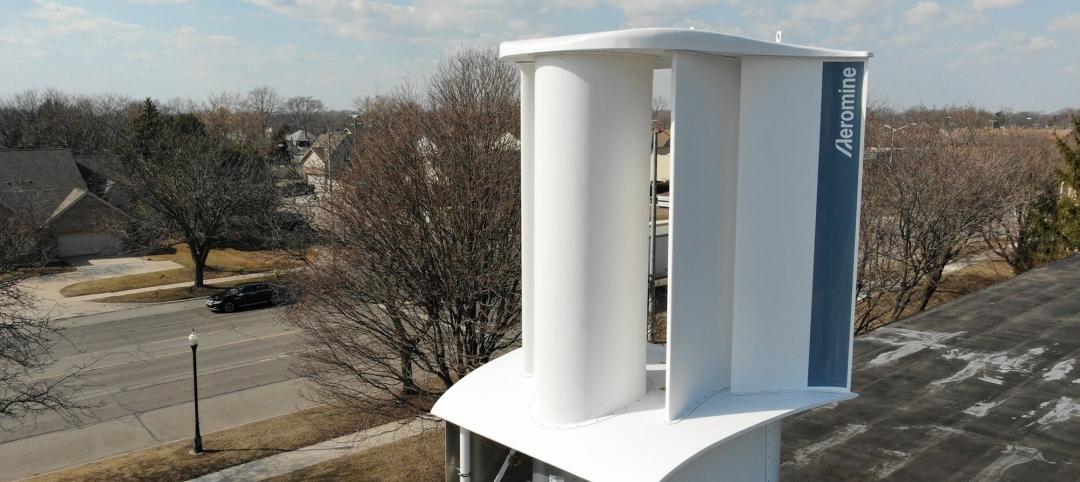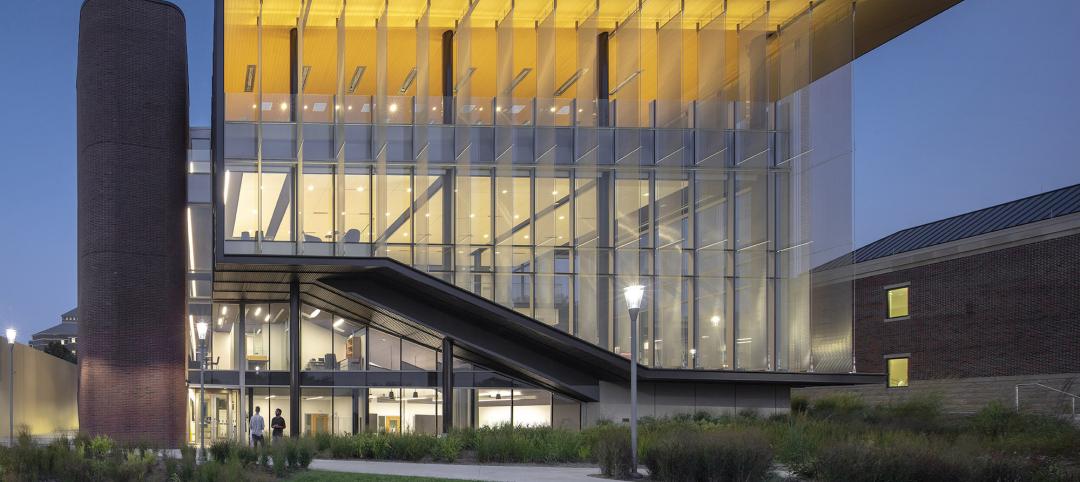Washington, D.C. – The American Institute of Architects (AIA) Committee on Architecture for Education (CAE) has selected five educational and cultural facilities for this year’s CAE Educational Facility Design Awards. The CAE Design Excellence Award honors educational facilities that the jury believes should serve as an example of a superb place in which to learn, furthering the client's mission, goals and educational program while demonstrating excellence in architectural design. These projects exemplify innovation through the client's educational goals through responsive and responsible programming, planning and design. Function and surrounding regional and community context are valued as part of the planning and design process.
California State University, Northridge Student Recreation Center; Northridge, California
LPA, Incorporated
The Student Recreation Center strategically creates a strong bookend to the east end of the campus, providing a dynamic, energetic approach to recreation. The design concept is clearly executed with a judicious use of colors and finishes. Upon entering the building natural lighting and material choices raise excitement and motivate movement. As an athletic building, it captures the energy and impetus of the various sporting activities inside. Strong transparency and interconnections between spaces inside the building are appealing, inviting and conducive to exercising. Compositionally it is assured and confident. Its community connection is highly apparent. Rainwater collection, natural ventilation, and day lighting are strong sustainable design features that are nicely integrated into the design. It was evident to the jury that students were involved in the conceptualization process and planning.
Sandy High School; Sandy, Oregon
Dull Olson Weekes – IBI Group Architects
Breathtakingly detailed as a public school, Sandy High School sets very high standards in terms of materials, finishes and aesthetics. Sitting lightly on the land, the building allows nature to penetrate the campus. It takes advantage of the hillside and creates panoramic views while nestling comfortably on the contours. Visible green roofs below adjacent classrooms add to hillside views while remaining roof areas are opportunities for power generation. Transparency between classrooms and common areas is executed boldly, with floor to ceiling glass suggesting a confidence with the user groups. Single loaded corridors were used to great effect by allowing natural light into both sides of learning spaces. Exterior treatments reflect the region in a wonderful and indigenous way and incorporate pleasant verandas with deep overhangs. The usable space per student and color combinations contribute to and promote student development.
Hinds Community College Jobie L. Martin Classroom Building; Jackson, Mississippi
Duvall Decker Architects
This simple and honest building with strong forms and an elegant façade shows that a few simple gestures can render a sense of identity to an otherwise nondescript campus. The rigorous use of materials, straightforward detailing, and clarity of concept elevates the modest program to a new level. The jury admired the light airy classrooms that combined the translucent, transparent, fixed, and operable glazing.
Mesa Community College Health Wellness Building; Mesa, Arizona
SmithGroupJJR
The transformation of this postindustrial concrete building into a light filled, translucent learning environment is exceptional. This project sets a high standard for reuse and repurposing of an existing building and demonstrates how constraints can benefit and strengthen a project. The conversion of leftover space between buildings creates dynamic and interactive circulation opportunities. The exterior is striking in its bold gestures, especially at night.
Cranbrook Kingswood Girls’ Middle School; Bloomfield Hills, Michigan
Lake|Flato Architects
This design integrates form and function in ways reminiscent of the Crow Island School. The building is indicative of an independent language that fits well within the campus context. Cranbrook Kingswood Girls' Middle School is beautifully detailed, appropriately contextual in a place where expectations are very high, modest in scale, yet intimate. The variety of shared common learning spaces connects directly to the exterior while providing opportunities to integrate imaginative ideas into the educational environment. The scale of the interstitial spaces and classrooms give a very secure feeling to the learning environment. This school builds on great traditions but creates a quality and life of its own.
Jury
The 2013 CAE Educational Facility Design Awards jury includes: Steven M. Shiver, AIA, Chair, NAC Architecture; John R. Dale, FAIA, Harley Ellis Devereaux; Linda Nelson Keane, AIA; Victor Sidy, AIA, Taliesin School of Architecture and C. Kenneth Tanner, University of Georgia.
About the Committee on Architecture for Education (CAE)
The CAE is a large and active group of architects and allied professionals concerned with the quality and design of all types of educational, cultural, and recreational facilities. While a large portion of CAE members practice in the K-12 and post-secondary education markets, they look to serve the needs of those in the entire pre-K to 99 markets. CAE identifies national educational facility issues critical to architects and works to strengthen relationships with allied organizations, client groups, and the public.
About The American Institute of Architects
Founded in 1857, members of the American Institute of Architects consistently work to create more valuable, healthy, secure, and sustainable buildings, neighborhoods, and communities. Through nearly 300 state and local chapters, the AIA advocates for public policies that promote economic vitality and public well being. Members adhere to a code of ethics and conduct to ensure the highest professional standards. The AIA provides members with tools and resources to assist them in their careers and business as well as engaging civic and government leaders, and the public to find solutions to pressing issues facing our communities, institutions, nation and world. Visit www.aia.org.
Related Stories
Office Buildings | Feb 9, 2023
Post-Covid Manhattan office market rebound gaining momentum
Office workers in Manhattan continue to return to their workplaces in sufficient numbers for many of their employers to maintain or expand their footprint in the city, according to a survey of more than 140 major Manhattan office employers conducted in January by The Partnership for New York City.
Giants 400 | Feb 9, 2023
New Giants 400 download: Get the complete at-a-glance 2022 Giants 400 rankings in Excel
See how your architecture, engineering, or construction firm stacks up against the nation's AEC Giants. For more than 45 years, the editors of Building Design+Construction have surveyed the largest AEC firms in the U.S./Canada to create the annual Giants 400 report. This year, a record 519 firms participated in the Giants 400 report. The final report includes 137 rankings across 25 building sectors and specialty categories.
University Buildings | Feb 8, 2023
STEM-focused Kettering University opens Stantec-designed Learning Commons
In Flint, Mich., Kettering University opened its new $63 million Learning Commons, designed by Stantec. The new facility will support collaboration, ideation, and digital technology for the STEM-focused higher learning institution.
Sustainability | Feb 8, 2023
A wind energy system—without the blades—can be placed on commercial building rooftops
Aeromine Technologies’ bladeless system captures and amplifies a building’s airflow like airfoils on a race car.
Codes and Standards | Feb 8, 2023
GSA releases draft of federal low embodied carbon material standards
The General Services Administration recently released a document that outlines standards for low embodied carbon materials and products to be used on federal construction projects.
University Buildings | Feb 7, 2023
Kansas City University's Center for Medical Education Innovation can adapt to changes in medical curriculum
The Center for Medical Education Innovation (CMEI) at Kansas City University was designed to adapt to changes in medical curriculum and pedagogy. The project program supported the mission of training leaders in osteopathic medicine with a state-of-the-art facility that leverages active-learning and simulation-based training.
Multifamily Housing | Feb 7, 2023
Multifamily housing rents flat in January, developers remain optimistic
Multifamily rents were flat in January 2023 as a strong jobs report indicated that fears of a significant economic recession may be overblown. U.S. asking rents averaged $1,701, unchanged from the prior month, according to the latest Yardi Matrix National Multifamily Report.
Giants 400 | Feb 6, 2023
2022 Reconstruction Sector Giants: Top architecture, engineering, and construction firms in the U.S. building reconstruction and renovation sector
Gensler, Stantec, IPS, Alfa Tech, STO Building Group, and Turner Construction top BD+C's rankings of the nation's largest reconstruction sector architecture, engineering, and construction firms, as reported in the 2022 Giants 400 Report.
Giants 400 | Feb 6, 2023
2022 Transit Facility Giants: Top architecture, engineering, and construction firms in the U.S. transit facility sector
Walsh Group, Skanska USA, HDR, Perkins and Will, and AECOM top BD+C's rankings of the nation's largest transit facility sector architecture, engineering, and construction firms, as reported in the 2022 Giants 400 Report.
Giants 400 | Feb 6, 2023
2022 Telecommunications Facility Sector Giants: Top architecture, engineering, and construction firms in the U.S. telecommunications facility sector
AECOM, Alfa Tech, Kraus-Anderson, and Stantec head BD+C's rankings of the nation's largest telecommunications facility sector architecture, engineering, and construction firms, as reported in the 2022 Giants 400 Report.


